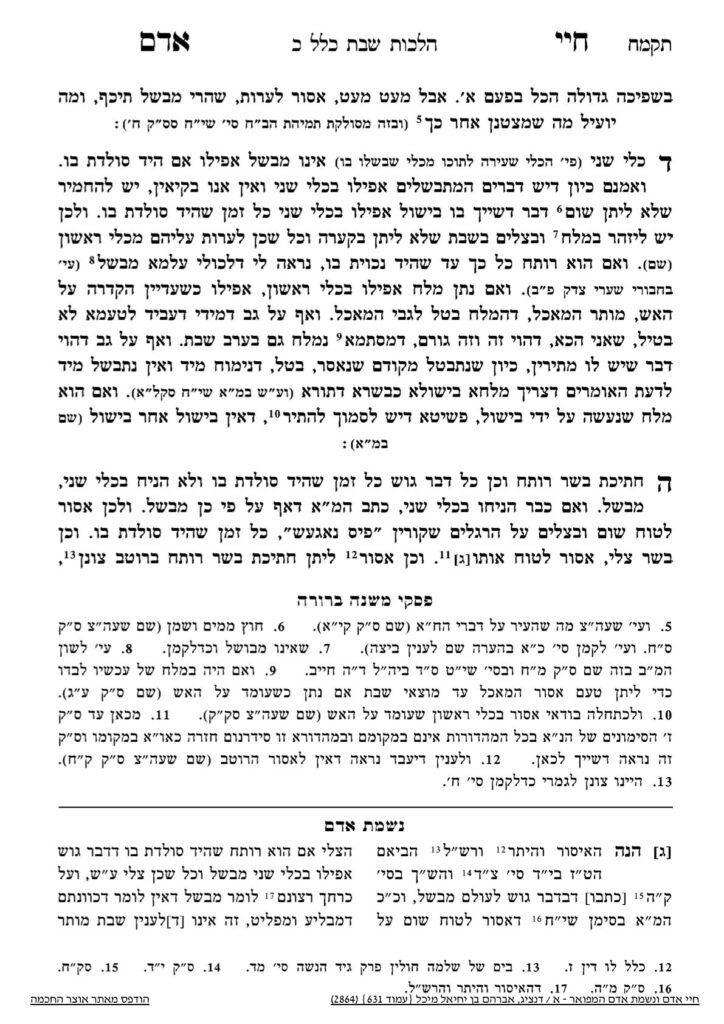We are continuing in siman 4, discussing adding salt to a food in a way that the salt will get cooked. We left off discussing the idea that it is possible that the salt added on Shabbos is halachically batel. According to one opinion, salt does not cook unless it is in a kli rishon directly on the fire, so when the salt is added to the food, it becomes batel to the food immediately (because zeh v’zeh goreim means that even though the salt adds flavor, it is halachically batel). Additionally, the rule that davar she’yeish lo matirin is not batel only applies when the item was originally distinct and then subsequently dissolved into the mixture. If at the moment of issur, it was not distinct, the rule would not apply. Therefore, if one adds salt to a food, even though the salt will now cook, the food does not become assur due to the added salt, because the salt does not cook immediately, and no issur exists before it become indistinct.
Nevertheless, one must be aware that should they cook by mistake, there is a concept of maaseh Shabbos. It applies also to shehiya and chazara which were performed in an improper halachic fashion which caused the food to become assur due to its placement on the fire. If it was improperly placed b’shogeig, there may be more room for leniency, which we will discuss further, beezras Hashem.
In siman 5, the Chayei Adam discusses the concept of davar gush. Davar gush is the concept that a solid retains heat differently than a liquid. A liquid moves around, and the entire surface of the liquid interfaces with the walls of the pot. When the walls of the pot are cold (not kli rishon), they cool the food and sap energy and heat out of the food. As it circulates, all of the liquid ends up touching the walls. A solid may touch the walls of the pot on the outside, but the inside of the food does not, so it retains its heat.
Thus, the idea that kli sheini cannot cook arguably does not apply to a davar gush. This point is a machlokes in halacha, and applies to Yoreh Deah as well, as it regards transferring flavor from one item to another. In Yoreh Deah, we pasken that davar gush is able to transfer flavor from one item to another. The Magen Avraham applies the concept to bishul as well, and the Mishnah Berurah follows the opinion of the Magen Avraham as well. Thus, we are concerned for bishul when a davar gush is placed in a kli sheini.
There are ways to differentiate between a solid cooking with liquid and a solid without any liquid. Since the liquid is constantly moving, and touching both the walls and the solid, it will cause the solid to cool down, albeit more slowly than other foods. We pasken that if there is liquid along with the davar gush, there is no concern for bishul in a kli sheini. If there is only solid food in the pot, we are concerned for bishul in a kli sheini.
There are some other limitations to davar gush, which we will discuss in the upcoming shiurim, be’ezras Hashem.
Summary
- We pasken that maaseh Shabbos b’shogeig is assur to all during Shabbos and muttar to all after Shabbos. Maaseh Shabbos b’meizid is assur to others during Shabbos and muttar to others after Shabbos, and assur to the person who performed the melacha forever.
- If a person adds salt to a food on Shabbos, there is an issue that something added for flavor does not become batel. On the other hand, there is a heter of zeh v’zeh goreim, so it is not a concern. There is an additional issue of davar sheyesh lo matirin, but it does not apply to salt added to a food, since the salt is not distinct after it was originally mixed into the food, and it becomes assur after it is mixed, at the moment when it actually cooks. Therefore, the food is not assur due to the salt added
- The concept of davar gush is that a solid food retains heat more than a liquid. We are concerned that a solid cooked without liquid can perform bishul in a kli sheini. If there is liquid in the pot as well, we are not concerned for bishul in a kli sheini.



